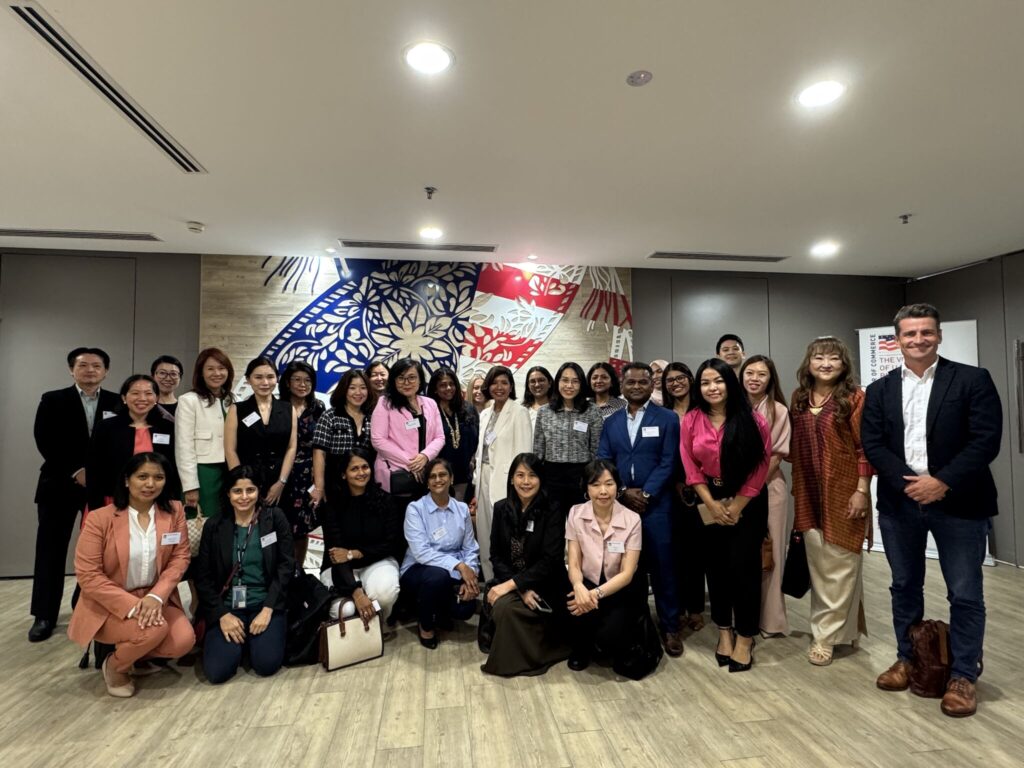
On March 19, 2025, the American-Malaysian Chamber of Commerce (AMCHAM), in collaboration with 30% Club Malaysia, hosted an engaging panel discussion titled “Powering Progress: Is DEI Still Relevant Today?.
The session brought together senior business leaders to explore the relevance, challenges, and opportunities of Diversity, Equity, and Inclusion (DEI) in the Malaysian corporate landscape.
The event kicked off with a compelling keynote address by Rejina Rahim, Co-Lead of the Influence Pillar at 30% Club Malaysia and Founder of Wahine Capital. Rejina set the stage with hard-hitting statistics, highlighting how gender parity alone could add USD 50 billion to Malaysia’s GDP by 2025 and why DEI must go beyond compliance to become a business and economic imperative.
Following her keynote, Rejina moderated a thought-provoking panel discussion featuring:
Sandy Ma – Regional HR Director, APAC, Keysight Technologies
Peter Murray – Country General Manager, Amazon Web Services (AWS)
Jun Maria Tan Abdullah – Senior Director, Payments Network Malaysia (PayNet)
The panelists shared real-world insights on how their organisations are integrating DEI into their workplaces, the obstacles they’ve encountered, and the strategies that have driven measurable impact. The discussion covered key issues such as gender representation, workplace policies, ethnic diversity, and inclusion of persons with disabilities (PWDs).
The event was attended by corporate members of 30% Club Malaysia as well as AMCHAM, all of whom engaged in a lively Q&A session, exchanging ideas on how Malaysia can move from policy to impact.
With businesses facing mounting pressures from investors, employees, and regulators to embed DEI into their strategies, this session underscored a crucial reality – DEI is no longer just about fairness; it is a business and economic necessity for Malaysia’s future.
The following article delves deeper into the key takeaways from the discussion and why DEI remains critical for Malaysia’s corporate and societal growth.
Why DEI is a Business and Economic Imperative
Many companies still see DEI as a compliance requirement rather than a strategic enabler of growth. However, the business case for DEI is undeniable:
📌 Boosting Malaysia’s GDP: A 2016 McKinsey Global Institute study estimated that advancing gender parity alone could add up to USD 50 billion to Malaysia’s GDP by 2025. With economic uncertainty and slow growth projections, DEI could be a key driver of national prosperity.
📌 Higher Profitability & Innovation: Companies in the top quartile for gender diversity on executive teams are 21% more likely to outperform their peers in profitability and 35% more likely to achieve superior financial performance. Given Malaysia’s 4% average PLC dividend yield, businesses can no longer afford to overlook the commercial benefits of diversity.
📌 Attracting Global Investment: Institutional investors are beginning to vote against boards that lack gender and ethnic diversity. BlackRock, State Street, and Vanguard have policies that push for greater boardroom representation. Malaysian companies that fail to align with these expectations risk losing global investors.
📌 Reflecting the Market We Serve: Malaysia’s workforce and customer base are diverse – shouldn’t leadership teams be as well? Companies that embrace DEI build stronger connections with consumers and improve decision-making by incorporating multiple perspectives.
The Malaysian Context: Unique DEI Considerations
Unlike in Western markets, DEI in Malaysia must be tailored to our cultural, religious, and regulatory environment. This means:
Cultural Sensitivity: DEI cannot be a copy-paste strategy from the US or Europe. It must align with Malaysia’s community-based values, religious considerations, and societal norms.
Government Policies: While some initiatives, such as the one-woman-on-boards mandate for PLCs, have been introduced, broader policies supporting parental leave, pay transparency, and anti-discrimination laws need strengthening.
SME Challenges: With 97% of Malaysian businesses classified as SMEs, many lack structured DEI frameworks. Bridging this gap is crucial to making DEI a reality beyond large corporations.
Moving from Policy to Impact: What’s Next?
The question is no longer “Is DEI still relevant?” but rather “How do we accelerate progress in Malaysia?” Here are three critical areas for action:
1️⃣ Education & Awareness – DEI must start early. Companies should work with schools and universities to cultivate an inclusive mindset in future talent. This can be integrated into CSR initiatives, mentorship programs, and leadership training.
2️⃣ Policy-Driven Change – Organisations need to go beyond regulatory compliance. This includes inclusive hiring, mentorship programs for underrepresented groups, and leadership succession planning that prioritizes diversity. If we don’t lift everyone, we risk economic stagnation.
3️⃣ Measuring Impact – “What gets measured gets managed.” Companies that track diversity metrics, pay equity, and employee engagement see better DEI progress. Regular reporting and transparency are necessary to hold leadership accountable.
Final Thoughts: DEI is a Collective Responsibility
Malaysia has the opportunity to lead in equitable growth, but it requires commitment from businesses, policymakers, and society as a whole. The economic argument is clear, the moral case is undeniable, and the time for action is now.
At 30% Club Malaysia, we continue to drive meaningful conversations and advocate for systemic change. But the real impact happens when leaders across industries take ownership of DEI—not as an obligation, but as a competitive advantage and a force for national progress.
🔹 How is your organisation prioritising DEI? Share your thoughts with us. Let’s build a Malaysia where no one is left behind.

